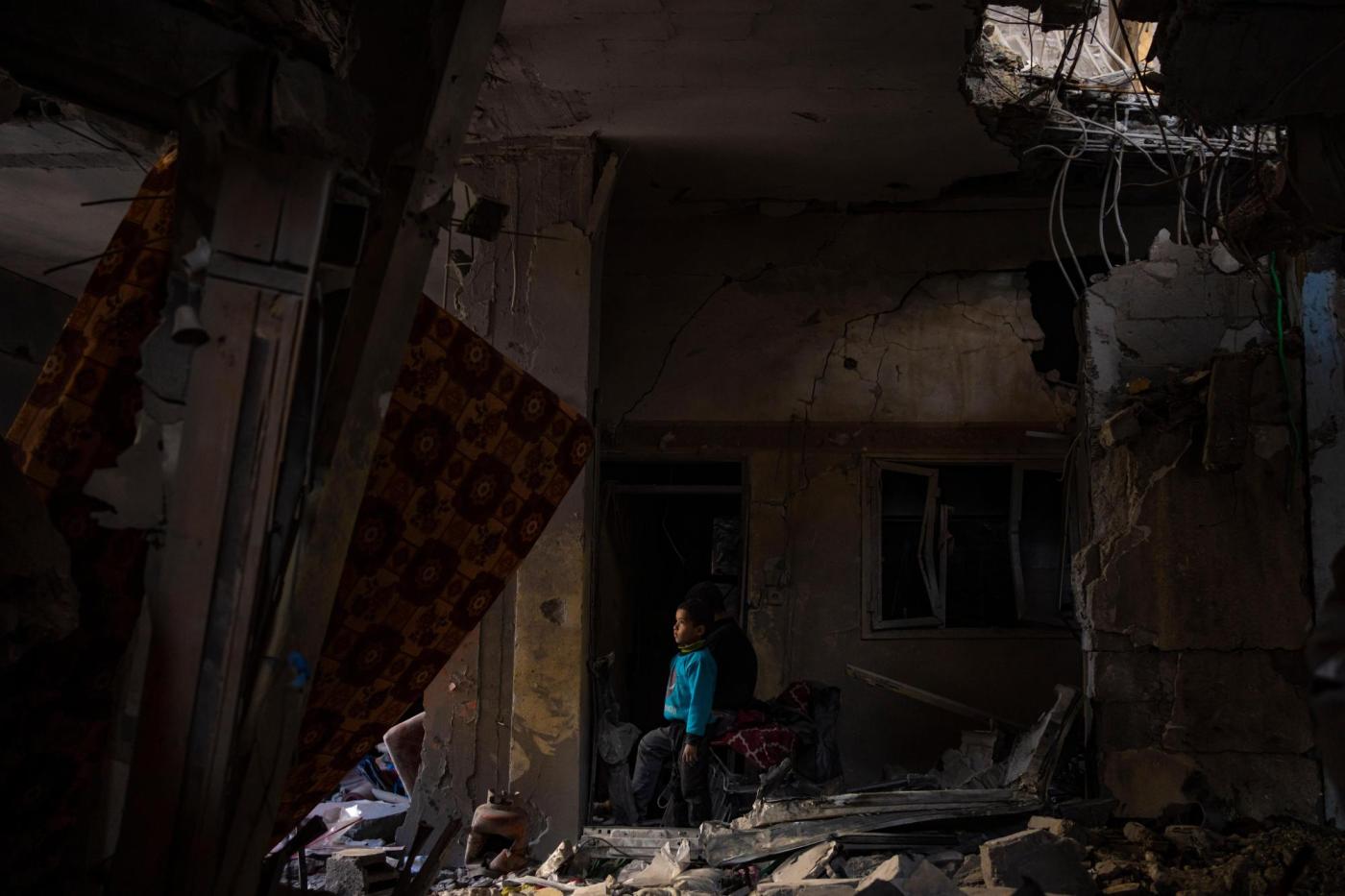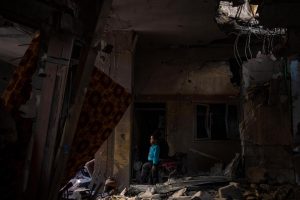
Netanyahu orders evacuation plan for densely packed Gaza city ahead of expected invasion
By JOSEF FEDERMAN, NAJIB JOBAIN, and BASSEM MROUE (Associated Press)
JERUSALEM (AP) — Israeli Prime Minister Benjamin Netanyahu on Friday said he has ordered the military to prepare a plan to evacuate civilians from Rafah ahead of an expected Israeli invasion of the densely populated southern Gaza city.
Related Articles
Minneapolis City Council overrides mayor’s veto, calls for Gaza cease-fire, end of U.S. military aid to Israel
The Senate votes to begin working on a last-ditch effort to approve funds for Ukraine and Israel
US drone strike in Baghdad kills high-ranking militia leader linked to attacks on American troops
Blinken says a Hamas-Israel deal is still possible even though the sides remain far apart
Trudy Rubin: ‘Two-state solution’ reemerges as the only way to Israel-Palestine peace
The announcement came after heavy international criticism, including from the U.S., of Israeli intentions to move ground forces into the city that borders Egypt. Rafah had a prewar population of roughly 280,000, and according to the United Nations is now home to some 1.4 million additional people living with relatives, in shelters or in sprawling tent camps after fleeing fighting elsewhere in Gaza.
Israel says that Rafah is the last remaining Hamas stronghold in Gaza after more than four months of war. Hamas has been designated as a terrorist organization by the United States, Canada and the European Union.
“It is impossible to achieve the goal of the war of eliminating Hamas by leaving four Hamas battalions in Rafah,” Netanyahu’s office said. “On the contrary, it is clear that intense activity in Rafah requires that civilians evacuate the areas of combat.”
It said he had ordered the military and security officials to come up with a “combined plan” that includes both a mass evacuation of civilians and the destruction of Hamas’ forces in the town.
Israel declared war after several thousand Hamas terrorists burst across the border into southern Israel on Oct. 7, killing 1,200 people and taking 250 others hostage. An Israeli air and ground offensive has killed roughly 28,000 Palestinians, most of them women and minors, according to local health officials. Roughly 80% of Gaza’s 2.3 million people have been displaced, and the territory has plunged into a humanitarian crisis with shortages of food and medical services.
Netanyahu has largely rebuffed international criticism of the civilian death toll, saying that Hamas is responsible for endangering civilians by operating and hiding in residential areas. But that criticism has grown in recent days as Netanyahu and other leaders vow to move into Rafah.
U.S. President Joe Biden said Thursday that Israel’s conduct in the war is “over the top,” the harshest U.S. criticism yet of its close ally. The State Department said an invasion of Rafah in the current circumstances “would be a disaster.”
The operation will be a challenge on many levels. It remains unclear where civilians can go. The Israeli offensive has caused widespread destruction, especially in northern Gaza, and hundreds of thousands of people do not have homes to return to.
In addition, Egypt has warned that any movement of Palestinians across the border into Egypt would threaten the four-decade-old peace treaty between Israel and Egypt. The border crossing between Gaza and Egypt, which is mostly closed, serves as the main entry point for humanitarian aid.
Israel already has begun to strike Rafah from the air. Airstrikes overnight and into Friday hit two residential buildings in Rafah, while two other sites were bombed in central Gaza, including one that damaged a kindergarten-turned-shelter for displaced Palestinians. Twenty-two people were killed, according to AP journalists who saw the bodies arriving at hospitals.
GROWING FRICTION
Comments from top U.S. officials about Rafah have signaled growing friction with Netanyahu after a visit to the region by U.S. Secretary of State Antony Blinken.
Blinken, who has been working with Egypt and Qatar on trying to mediate a cease-fire between Israel and Hamas, left the region Thursday without an agreement. But he said he believed it was still possible to strike a deal that would include an extended pause in fighting in exchange for the release of many of the more than 100 hostages held by Hamas.
Netanyahu appeared to snub Blinken, saying he will settle for nothing short of “total victory.” The Israeli leader has said the war seeks to destroy Hamas’ military and governing capabilities and return all hostages home. With Blinken still in town, Netanyahu said achieving those goals would require an operation in Rafah. Vedant Patel, a State Department spokesman, said Thursday that going ahead with such an offensive “with no planning and little thought in an area where there is sheltering of a million people would be a disaster.”
John Kirby, the White House’s national security spokesman, said an Israel ground offensive in Rafah is “not something we would support.”
Aid agency officials have also sounded warnings over the prospect of a Rafah offensive. “We need Gaza’s last remaining hospitals, shelters, markets and water systems to stay functional,” said Catherine Russell, head of the U.N. children’s agency UNICEF. “Without them, hunger and disease will skyrocket, taking more child lives.”
With the war now in its fifth month, Israeli ground forces are still focusing on the city of Khan Younis, just north of Rafah, but Netanyahu has repeatedly said Rafah will be next, creating panic among hundreds of thousands of displaced people.
AIRSTRIKES OVERNIGHT
Shortly after midnight Friday, a residential building was struck near Rafah’s Kuwaiti Hospital, killing five people from the al-Sayed family, including three children and a woman. A second Rafah strike killed three more people.
Another overnight strike, in the central town of Deir al-Balah, claimed nine lives. Also in central Gaza, a strike hit near a kindergarten-turned-shelter, damaging the building. It killed five and wounded several more people. Witnesses said shelter residents were asleep at the time.
A woman, carrying a small girl in her arms, shouted as she arrived at the local Al Aqsa Martyrs’ Hospital: “What can we do? This is the work of the coward Zionist enemy that chooses innocent civilians. This girl is firing rockets at the Jews? May God help us.”
Some of the wounded children were treated while lying on the floor.
WORKING FOR A CEASE-FIRE
Israel’s 4-month-old air and ground offensive — among the most destructive in recent history — has killed 27,947 Palestinians and wounded more than 67,000, local health officials said Friday. The war has driven most people from their homes and pushed a quarter of the population toward starvation, according to the U.N.
Biden has said said he continues to work “tirelessly” to press Israel and Hamas to agree on an extended pause in fighting.
Netanyahu has rejected Hamas’ demands for a hostage deal, which includes an end to the war and the release of hundreds of veteran Palestinian prisoners serving long sentences in Israel for deadly attacks carried out as part of the long-running conflict. Netanyahu dismissed Hamas’ demands as delusional, even as Blinken said he believes continued negotiations, through mediators Egypt and Qatar, are possible.
Israel’s war goals appear increasingly elusive, as Hamas reemerges in parts of northern Gaza, which was the first target of the offensive and has seen widespread destruction. Israel has only rescued one hostage, while Hamas says several have been killed in airstrikes or failed rescue missions.


